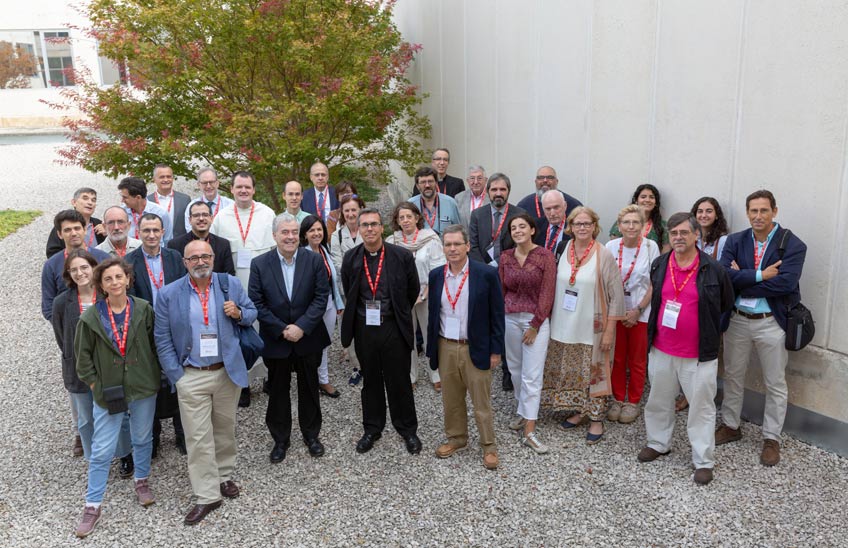About a hundred scientists, professors from high school and students from high school diploma participate in a forum on Catholic Scientists held at the ICS
The I congress of the Spanish section of the Society of Catholic Scientists addressed issues such as the contribution of contemporary physics to a religious worldview and the communication of science and the pedagogy of faith.

FotoManuel Castells<br>/Participantes del congreso celebrado en el Instituto Cultura y Sociedad
23 | 09 | 2022
More than one hundred scientists, professors from high school and students from high school diploma gave quotation at the I congress of the Spanish section of the Society of Catholic Scientists (SCS), which was held in the Institute for Culture and Society (ICS) of the University of Navarra from September 15 to 17.
Throughout the program, issues such as the contribution of contemporary physics to a religious worldview, the communication of science and the pedagogy of faith, the present and future of artificial intelligence, transhumanism and human freedom from the neurosciences, among others, were addressed.
Javier Sánchez Cañizares coordinated the event for association, of which he is a member. Speakers included Stephen Barr, president of the Society; Enrique Solano, director of the Spanish Virtual Observatory of the Astrobiology Center (INTA-CSIC); Max Bonilla, director International of high school Razón Abierta; and Catherine L'Ecuyer, researcher, popularizer and author of books and articles on Education.
Also participating were Fernando Sols and Ignacio Sols, professors at the Complutense University of Madrid; Ignacio López-Goñi and Javier Novo, professors at School of Sciences at the University of Navarra; Javier Bernácer and Francisco Güell, researchers of the group 'Mind-Brain' of the ICS; Sara Lumbreras, co-director of the Chair Hana and Francisco Ayala of Science, Technology and Religion of the Universidad Pontificia Comillas; and Ricardo Mejía, professor of the School of Philosophy of the Universidad Ramón Llull.
Existence of a creator God
Stephen Barr focused his talk on the motivations for creating a association of Catholic scientists. He recalled the call of St. John Paul II to believing scientists to put themselves at the service of the integration of science and faith in contemporary thought, overcoming the false impression that few scientists wish to share their faith. He also presented the reasons for the perception of a supposed conflict between science and faith, clarifying some of the main misunderstandings. Finally, he commented on his experience staff as president of the SCS since its founding in 2016.
Fernando Sols presented the contribution of contemporary physics to a religious worldview. He asserted that, for many reasons, it can be said that modern science strongly suggests, but does not prove, the existence of a creator God, with the attributes of powerful and intelligent.
For his part, Javier Novo reviewed the different stages in Joseph Ratzinger's thought on the relationship between evolution and creation. He explained that the two fundamental ideas that can be extracted from his thought are: that creation cannot be understood through the image of an artisan God; and that evolution does not exclude in itself the existence of a meaning or purpose in the cosmos.
Francisco Güell's discussion paper was entitled 'The unity of human life: point of meeting for dialogue between science and religion'. He reviewed and commented on those experiential attitudes of the Catholic scientist that favor evangelization.
Complementarity between religious and scientific education
This was followed by roundtable 'Communication of science and pedagogy of faith'. Enrique Solano focused on showing the need to explain the rationality of faith when presenting religious contents, as well as the compatibility and complementarity of religious and scientific instruction.
For her part, Catherine L'Ecuyer developed the influence of current educational trends in the communication of science and in the teaching of faith. She stressed the importance of trust between students and teachers and the need to foster guided wonder in the young.
Ignacio López-Goñi also explained that the difficulty in the public manifestation of religion in the sphere of science stems from a crisis of reputation of the Church and a lack of knowledge on the part of many scientists. He suggested that if this status is to be reversed, it is necessary to recover a communication that transmits trust, transparency, clarity and rigor. He also underlined the communicative and pedagogical advantages of storytelling.
Human freedom from the neurosciences' was the degree scroll of Javier Bernácer's intervention. He started from the hypothesis that society usually receives the message that neuroscience has shown that freedom does not exist. In his discussion paper he considered the experiments that support this statement, those that refute it and the consequences that the uncritical knowledge dissemination of this message has on people's behavior.
Transhumanism and human values
Ricardo Mejía addressed the present and future of artificial intelligence. He emphasized the words of Pope Francis who considers technological progress as a gift from God. For this reason, he expressed that it is false to accuse the Catholic Church of technophobia. He then pointed out the inadequacies of computational functionalism in understanding the human being, in which corporeality is essential. Finally, he explained how a Christian technophilia is possible.
Sara Lumbreras asked what can be learned from transhumanism. She considered that Christians can learn from the optimism of transhumanist postulates to the extent that they relate them to human values, thus overcoming false utopias and the problems of human desires devoid of values. He pointed out that it would be possible to assume some of the desires of transhumanism in order to purify them. He pointed out that transhumanism needs a new humanism to which faith can contribute, since the human being must be the measure of technology.
Finally, Ignacio Sols referred to the mutual inspiration between science and religion throughout history. He developed the thesis that Christianity has been for the development of the natural sciences what Greek civilization was for the development of mathematics. He argued that both Christianity and the Greeks received from their specific worldview the necessary inspiration to create and cultivate these sciences.
